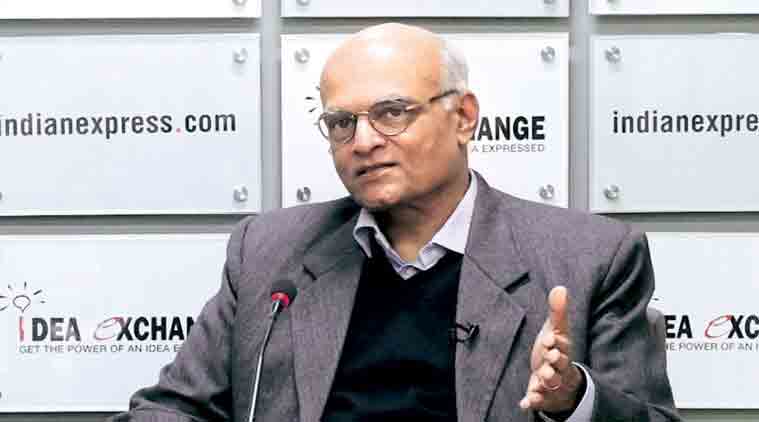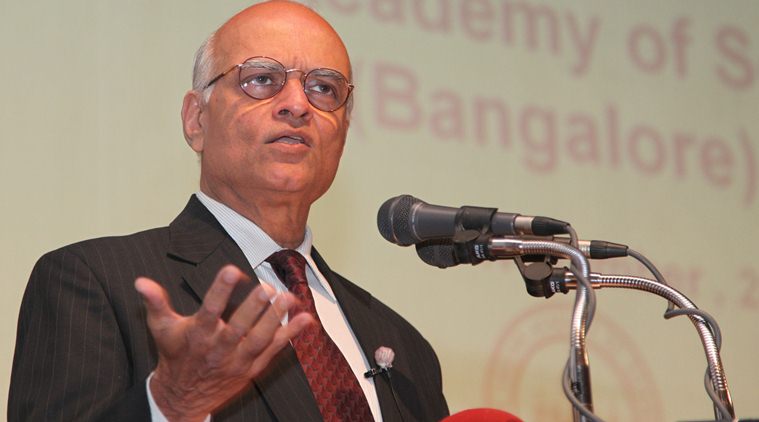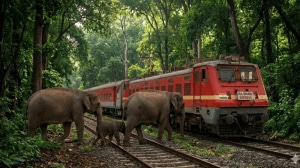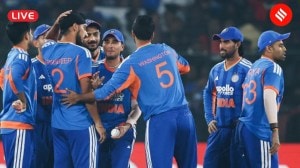Stay updated with the latest - Click here to follow us on Instagram
Do not see cross-LoC strikes minimising Pak bid to stir up trouble, spread alienation in J&K: Former NSA Shivshankar Menon
It has been our consistent official position that J&K is an inalienable part of India, and that the issue with Pakistan is the return of Pakistan-occupied territory.
 Former National Security Advisor Shivshankar Menon (Express Photo)
Former National Security Advisor Shivshankar Menon (Express Photo)
Policies are made with outcomes in view rather than eye on headlines, says former National Security Advisor Shivshankar Menon. He spoke to The Indian Express on a range of issues — from his UPA years to options weighed during 26/11 to addressing the situation in Jammu and Kashmir.
WATCH VIDEO: India Launches Assault Against Pakistani Posts: Here’s What Happened
Excerpts from the interview:
The Indian Army and the government owning up the surgical strike were no less important than the operation itself along the Line of Control. Do you agree with this view?
I think that we need, in such cases, to distinguish between a narrative or story, and the substance or outcomes that such actions are meant to produce. Clearly, outcomes are much more important to the national interest than a story.
How will this overt operation impact India-Pakistan relationship in the short term? What could be the long-term consequences?
This operation is part of a long-term process of managing the situation on the Line of Control and of limiting action of the jehadi tanzeems and their sponsors in Pakistan. As such, it will have some short-term effect. But it will not alter the fundamental drivers of the India-Pakistan relationship or the managed hostility that elements in the Pakistani establishment seek with India, largely for their own institutional interests in Pakistan.
The government believes that the overt operation has given the country a great psychological advantage. That it has boosted the confidence of the soldier and the common man. No more ‘kitne saal maar khayenge, kab tak’. Do you agree?
This is really a question in pop psychology. I do not think that emotions or gratification of this sort should be the sole or main basis of serous policy and actions.
Do you think India’s announcement has confused Pakistan? How is Pakistan likely to react?
This is for Pakistan to answer. The government of India’s choice of action, and the manner of its initial announcement, seem to have been designed to prevent an escalation of the situation on the Line of Control with Pakistan while signaling firmness internally in India.
 “As far as I can see what the present government has done remains within the framework of strategic restraint that previous governments of India have followed,” said Menon. (Express Photo)
“As far as I can see what the present government has done remains within the framework of strategic restraint that previous governments of India have followed,” said Menon. (Express Photo)
Why did Manmohan Singh, as Prime Minister, take a political call not to make public the strikes across the border?
All previous governments of India have chosen to deal with such issues covertly because they were focused on creating outcomes rather than managing public opinion.
As National Security Advisor, were you in favour of keeping strikes secret? Or, were you simply following the political call of the government? Why?
All such calls or decisions are ultimately political, and should be so in a democracy. My personal views are irrelevant. And the previous policy worked. It produced the outcome sought, namely, restoring peace on the Line of Control and limiting infiltration for a while.
You have argued that, “By keeping operations covert rather than overt, it was made possible for the Pakistan Army to climb down and for a temporary peace to be re-established.” Hardliners in New Delhi may argue that it is not India’s task to help Pakistan ‘climb down’ after they have shed Indian blood on the border. Also, was the LoC really ever pacified?
This government too has done so by saying, in DGMO’s initial announcement that it planned no further action, by acting only against the jehadi launch pads and not the Pakistan Army, and by not choosing to enter into public disputation with Pakistan by releasing videos or other evidence.
Do you think “temporary peace” came at a huge cost for India and quite cheap for Pakistan?
No. Because the limited peace was used for the more important purpose of addressing alienation among the population of the Indian state of Jammu and Kashmir and to restore normalcy within the state after a period of extreme stress and cross-border terrorism in the early Nineties.
The government says the idea behind making the LoC operation public is to make Pakistan understand that infiltrations, frequent skirmishes and deaths of civilians and soldiers in ceasefire violations will not be cost-free, not anymore. Will India succeed?
Cross-border terrorism never was cost-free and never should be. At the same time, we should be clear that such operations will not change the minds of our adversaries or stop cross-border terrorism from Pakistan into India. Their purpose can, therefore, only be tactical, as they are unlikely to have strategic or long-term effects.
How will Delhi’s still unfolding tactics on Pakistan impact India-China relations?
This remains to be seen. To a great extent that depends upon the decisions that China takes to support India in fighting cross-border terrorism from Pakistan.
Many in India are asking, ‘Why is China defending Jaish-e-Muhammad chief Masood Azhar?’. There is a perception that it is China which is protecting Pakistan, making it strong enough to take on India in a low-intensity war. Do you think the popular narrative on such a complicated diplomatic issue will, in the long run, harm Indian interests?
Only China can answer for herself and her actions. I actually think it is useful if China is left in no doubt of the negative impact that some of her actions have on India’s interests and on opinion in India, since ultimately the general thrust of policy will be affected by the direction of public opinion in a democracy like India.
Do you think that Indian support for dissent in Balochistan will help reduce the pressure on Kashmir? Will official mention of Balochistan help or harm India?
Here again, my preference is that we make policy with outcomes in view rather than with an eye on the headlines. Only the government can say what its words on Balochistan actually mean in practical actions that India will take, now that it has chosen to speak on the issue in public, and what outcomes it expects those words to produce.
In your new book ‘Choices: Inside the making of India’s Foreign Policy’ you have said that soon after the Mumbai terror attack, Pranab Mukherjee and you were in favour of immediate retaliatory strikes inside Pakistan and Pakistan-occupied Kashmir (PoK). Why were strikes not conducted? Who in the government were against it?
This is not an accurate or complete characterisation of what the book says. Immediately after the Mumbai attack, there was naturally a discussion within and outside government of what India’s response should be and overt military action was certainly one of the actions that was seriously considered. This is a normal process in any democratic government. Many heads and opinions make better policy.
My book actually argues, by looking at different cases, that there is no simple right or wrong, black or white, true or false, good or bad choice in such foreign policy and national security decisions. Besides, these decisions are made in the fog of events, without the clarity or knowledge of all the factors that comes with hindsight. Policy makers, therefore, seek to minimise harm and maximise gain.
The ruling party and the government say that Prime Minister Narendra Modi deserves full credit for the ‘political decision’ to go for the strike and the Indian Army the full credit for its successful execution. Do you agree?
How the government describes its decision-making and who they choose to give credit to is clearly a matter of domestic politics to them. But the political desire to claim credit should not in any way take away the admirable professionalism with which the Indian Army has conducted itself.
You have claimed that operations across the Line of Control were not publicised in the past because they were not aimed at domestic constituencies. Many leaders in the government will counter that by saying public opinion cannot be ignored by popular leaders. A senior BJP leader wanted to know why was the NDA government being judged so harshly for reaching out to the domestic constituencies…
I think that public opinion is certainly a factor in all political decisions. At the same time, a decision to use force by a state is also a military decision, with policy and other impacts on relations with other actors and countries and on the national interest. It is important that the quest for publicity should not be the main driver of decisions with important consequences beyond the public mood. Besides, it is the function of leaders to explain their decisions and to lead public opinion too, not just to follow it blindly. I think that we underestimate the wisdom of the Indian public if we only make lowest common denominator decisions to play to domestic constituencies.
 “I do not see cross-LoC strikes minimising Pakistan’s attempts to stir up trouble or spread alienation among the people of J&K,” Menon said. (Express Photo)
“I do not see cross-LoC strikes minimising Pakistan’s attempts to stir up trouble or spread alienation among the people of J&K,” Menon said. (Express Photo)
Do you think that the bilateral strategic framework of restraint needs a re-look since Pakistan remains in a central position to add fuel to fire in the Kashmir Valley?
As far as I can see what the present government has done remains within the framework of strategic restraint that previous governments of India have followed. What seems to have changed is the domestic rhetoric that some party and other officials are using on and off the record.
You mention the situation in J&K. That is by far the most important issue that should be addressed. I do not see cross-LoC strikes minimising Pakistan’s attempts to stir up trouble or spread alienation among the people of J&K.
Pakistan and a few countries argue that unless the issue of Kashmir is settled, peace cannot be established in South Asia. The government in New Delhi supports the hard line on Kashmir. For them, the dispute is mainly about Pakistan-occupied Kashmir. In such a situation, how will there be peace on the border?
It has been our consistent official position that J&K is an inalienable part of India, and that the issue with Pakistan is the return of Pakistan-occupied territory. But that has not prevented us from seeking to lessen the burden that India-Pakistan tensions impose on our people in J&K.
J&K was relatively peaceful a few years ago. This was certainly not due to Pakistani goodwill. Pakistani interference and meddling has been a constant factor which we have to neutralise. That continues. Besides that, I think that we should look seriously and honestly into the reasons why J&K is no longer peaceful and identity the reasons why alienation and violence have grown to such an extent. A sensible policy would first address those causes that are within our control, addressing which would have the most effect.
The government has said that the increase in ceasefire violations by Pakistan is due to the Indian Army’s intensified response to acts of aggression by the Pakistan Army and Pakistan-based non-state actors. What dangers lie in this cycle of ferocious action and counter-action?
We have to see how far both governments wish to allow the cycle of violence to continue or escalate. The signs so far suggest that neither has yet indicated a desire to escalate the situation. Winter and other objective factors, like the Indian Army’s success in stopping infiltration and intelligence-led operations against terrorism, will determine the numbers of violations or infiltrations more than individual ceasefire violations or limited cross-border actions such as these.







